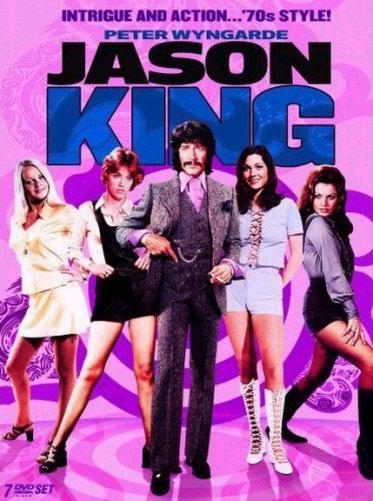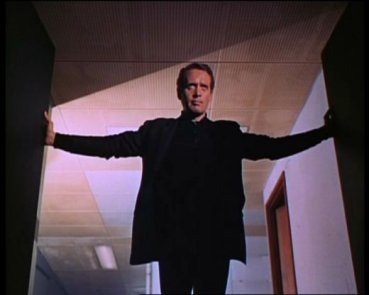|
Children of Bond: Jason King and The Prisoner

Jason King is a cult British television series that ran from 1971 to
1972 for 26 episodes. Jason King, wonderfully played by the urbane and
rather camp Peter Wyngarde, was originally a character in a sixties
television series called Department S. I've never seen Department S but
it was apparently about a team investigating strange mysteries and a
flamboyant dandy by the name of Jason King outshone the other
characters so much he got his own series. Jason King is a playboy
author who writes adventure novels about a character called Mark Caine
- who is of course more or less him. He's not just a writer though but
a brilliant detective and is forever being sought out by villains,
beautiful women, and foreign governments to do something for them,
constantly becoming mixed up in all sorts of intrigue. Think of him as
a cross between James Bond, Beau Brummell and Charles Hawtrey. A
typical morning for Jason King in his bachelor pad will have him
contemplating a champagne and strawberries breakfast in an outrageous
gold dressing gown and then being kidnapped by foreign villains and
waking up in Moscow or something.
Jason King is still a lot of fun, one of the campest and most
ridiculous television programmes ever put on the air and I was hooked
from the kitsch title sequence which has a fantastic seventies theme
tune and an amusing montage of our hero camping around with his
mustache in places like a ski lodge and a sauna. Jason King is
absolutely preposterous and - with its comedy acting and wobbly sets -
is essentially a real version of Garth Marenghi's Darkplace. One of the
funniest things about the series is that Jason King is in a different
country in virtually every episode and yet it's completely obvious that
the cast and crew never spent a single solitary day abroad. The grainy
stock footage of European capitals is almost used as a joke before we
inevitably go back to Jason King inside his hotel room yet again.
Wyngarde has immortal lines, like when he is late for dinner in one
episode and explains that he "couldn't do anything with my mustache".
Yes. This is a man who spends hours grooming his mustache so no wonder
he's always late! The series was inspired by the spy genre and James
Bond and is a sort of Bond with the camp factor turned up to eleven.
Wyngarde changes his colourful seventies outfits frequently and seems
to be enjoying himself, drawling bon mots and sipping champagne as our
unflappable hero.
It's glaringly obvious that Wyngarde can't fight to save his life when
King has a scrap and yet somehow this only adds to the charm. Wyngarde
has a wonderful voice and it's a shame that he was banished from
television not long afterwards for revelations about his personal life
that no one would care about today. Jason King is a series that would
probably not get past any political correctness detectors now with its
abundance of scantily clad women who are all powerless to resist our
hero - despite the fact that he looks like a cheesy entrant in the
Eurovision song contest. Wyngarde and the knowingly camp trappings are
so much fun it doesn't really matter that the plots are often similar
and needlessly convoluted. They come across as rehashes of the sort of
stuff shows like The Avengers and The Champions used to do - full of
British actors playing shady foreign villains with dodgy accents. There
are many familiar faces in the series you'll recognise, everyone from
Felicity Kendal to Ingrid Pitt.
My favourite episode is probably If It's Got to Go, It's Got to Go,
which has Jason staying (for reasons which escape me now) at a health
farm in Germany where all manner of strange things are going on. The
health farm is run by a villainous pair played by no lesser figures
than Yootha Joyce and John Le Mesurier and seems to be populated by
young women who are always exercising with few clothes on. King is a
famous gourmet of course and the basic diet there has him wistfully
flicking through a hilarious looking seventies cookbook for much of the
episode. To Russia with Panache is another fun one. In the pre-title
sequence three Russian men are mysteriously reduced to ashes in a lift
and King is kidnapped and sent to Moscow in a wooden crate. He agrees
to solve the case for the Russians and soon has the female guide and
interpreter fighting over his attention. Before long, everyone there
wants to be just like Jason King. Some of the accents in this episode
are so funny they must have been intentional.
An episode supposed to be set in Greece is called Nadine and is also a
good one. It features Ingrid Pitt and seventies Bond candidate Patrick
Mower. King is sent to Athens by his publisher to work on his book and
hangs around his hotel bored drinking scotch in elaborate dressing
gowns until a mystery woman enters his life. In case you hadn't noticed
by yet, Jason King has a fairly enviable life. This is not a man who
has ever waited for a bus in the rain or done a shift in a factory and
the total fantasy world one enters here is perhaps the thing that gives
the show its greatest appeal. I liked too another episode that I can't
remember the name of (there are 26 of them) where King goes to Hong
kong when he hears someone has done a comic about him. When he arrives
in the morning he goes to the airport bar and declares that it's too
early for coffee and he'll have a double scotch! If you find
seventies fashions amusing and like Peter Wyngarde and a bit of fantasy
television now and again then Jason King remains great fun.

The Prisoner only ran for seventeen episodes from 1967 to 1968 but its
surreal atmosphere and location (the Hotel Portmeirion in
Penrhyndeudraeth, North Wales), not to mention the tightly wound,
irritable and defiant central character 'Number Six', marvelously
played by Patrick McGoohan, was enough to give it enduring cult status
and a reputation as one of the most interesting fantasy shows ever to
appear on television. Number Six of course was an unnamed British agent
of some sort who resigns from his job only to wake up in a strange
seaside village that seems to be impossible to escape from, is
populated by eccentric characters, and closely watched over by
surveillance devices.
Where is he? Who is he? Who is 'Number One'? asked the viewers and The
Prisoner's penchant for throwing out questions and mysteries and then
never quite answering them sort of made it the Lost of its day I
suppose, the latter show obviously owing a debt to The Prisoner. It is
especially interesting to look at the ever changing era that spawned
the show. The sixties was a decade of great technological advances but
also of counter-culture and drugs and an explosion of pop music. The
Prisoner managed to tap into many of these things in a series that
included spy and sci-fi elements but was difficult to ever shove
completely into any one single box. The Prisoner used the fear that
technology and science could just as easily be used to sedate and
control us as liberate us and make our lives easier to good effect and
its often bonkers surreal flourishes (the last episode in particular is
one of the strangest!) seemed to be part of the trippy alternative
culture that had become an image and symbol of the decade. The Prisoner
even used a Beatles song in an episode to signal it too was a part of
everything swirling around it at the time.
One interesting thing about The Prisoner is the way it segues in with
McGoohan's most famous role until then - that of secret agent John
Drake in Danger Man. Number Six is a former spy afterall. The Prisoner
was believed to be a forthcoming spy series like Danger Man when it was
first heard of but the end result was far stranger and more offbeat
than anyone had been anticipating. Penrhyndeudraeth was essentially an
extra character in the show and a huge part of the atmosphere. The
Bondish retro sci-fi look and and slightly off-kilter sets of the The
Prisoner still make it look great today. In a strange show like The
Prisoner theories and any vague attempts at clarity are always quite
compelling. It's rather like Lost in this respect where a big part of
the experience is the personal theories and speculations of the fans.
Neither Lost or The Prisoner were ultimately willing to explain all
although in the case of the former it was probably more down to the
'we're making this up as we go along' factor rather than the stately
obtuseness of The Prisoner's always enigmatic personality.
Although Jason King and The Prisoner are remarkably different shows in
tone and style, both are certainly worth seeking out if you've never
seen them before.
- Jake
c
2010
Alternative 007
|

|


